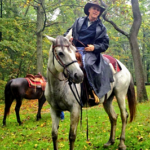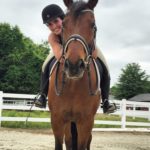 Margo Wottowa and Hot Rod | Courtesy, Cynthia Medina
Margo Wottowa and Hot Rod | Courtesy, Cynthia MedinaThirteen-year-old Margo Wottowa, a Pony Clubber from Columbia, Illinois, had just finished a jumping lesson with Hot Rod, her 14-year-old Quarter Horse gelding. It was a good session, she thought as she checked his legs and then walked him to the shower rack for a cooling bath. While his coat dried she planned to hand-graze him.
But Margo had led Hot Rod only a few feet into the summer grass when he stopped and refused to move. Usually he loved to graze in the shade behind the big barn at Avalon Horse Farm in Millstadt, Illinois. Margo sensed that something was wrong. Then she noticed that Hot Rod was breathing rapidly and had begun to sweat. She knew her horse and his habits and she recognized trouble when she saw it. Margo immediately went to get help.
If the incident had occurred a few weeks earlier, the young rider might not have been quite as quick to react. But Margot had participated in a one-day unmounted horse-management camp that I conducted in 2012 with the help of the Silver Springs Pony Club, located in the Midwest region. A Pony Club graduate myself, I’d witnessed the organization’s increased effort over the years to build members’ hands-on horse-management skills, and I’d come up with a new idea for my annual camp: Teams of participants each drew a card that outlined a scenario involving an equine illness or injury. In addition to details that I provided, there were questions for the team to research and answer: What could cause the horse’s symptoms? How do you monitor vital signs? What do they indicate? Each team also made a mock call to the vet.
Margo’s group drew the card for a colic emergency.
So on the day that Hot Rod showed signs of distress, Margo recalled what she had learned at camp. She quickly found her mother, Denise, and her trainer, Lei Ruckle. While they contacted the vet, Margo checked Hot Rod’s vital signs, relayed the information and asked what they should do next. She continued recording Hot Rod’s vital signs every 15 minutes. She shared the information with the vet when he arrived. He administered Banamine and after examining Hot Rod said the horse required emergency surgery. It revealed that adhesions had blocked the large intestine. But the operation successfully resolved the problem. The vet told Margo that her prompt response had saved her horse’s life.
Hot Rod spent five days recovering at the clinic before heading home to Avalon Farm. When the vet visited to conduct his first post-op exam, Margo showed him a chart that detailed the horse’s vital signs as well as pertinent aspects of his daily routine: when and how much he was fed, the amount of water he was drinking—and more. The vet was impressed by Margo’s efforts. Yet he showed one sign of concern as they approached Hot Rod’s stall. There was no sign of manure—usually a red flag for a horse recuperating from colic surgery. “Is Hot Rod regularly passing manure?” the vet asked. “Yes,” Margo replied, “let me get the manure chart.”
In response to the vet’s somewhat quizzical expression, Margo explained that no one at Avalon wanted Hot Rod to stand or lie in manure during his recuperation. So they all pitched in to keep the stall clean and recorded a variety of information on the chart Margo had prepared: when the stall was mucked, the number of piles, the manure’s color and consistency, etc. “I don’t think we have a thing to worry about during Hot Rod’s recovery,” the vet said. “He’s in very capable hands.”
A couple of months later, Margo got the go-ahead to begin to hand-walk her horse. It was three months before she could saddle him and start light work at the walk and trot. I was delighted that they were able to assist me during an early November mounted meeting at Avalon as we covered foxhunting skills for the D members. I can still see Margo’s beaming smile as she rode Hot Rod.
It’s a poignant memory now. Unfortunately, the day before Thanksgiving Margo’s beloved horse suffered a colic episode for which there was no fix. She was devastated by the loss. They had been together for just 18 months. But deep in her heart Margo knew she had done everything she could for Hot Rod in that time and she’d done it right.
This article originally appeared in the January 2015 issue of Practical Horseman.







